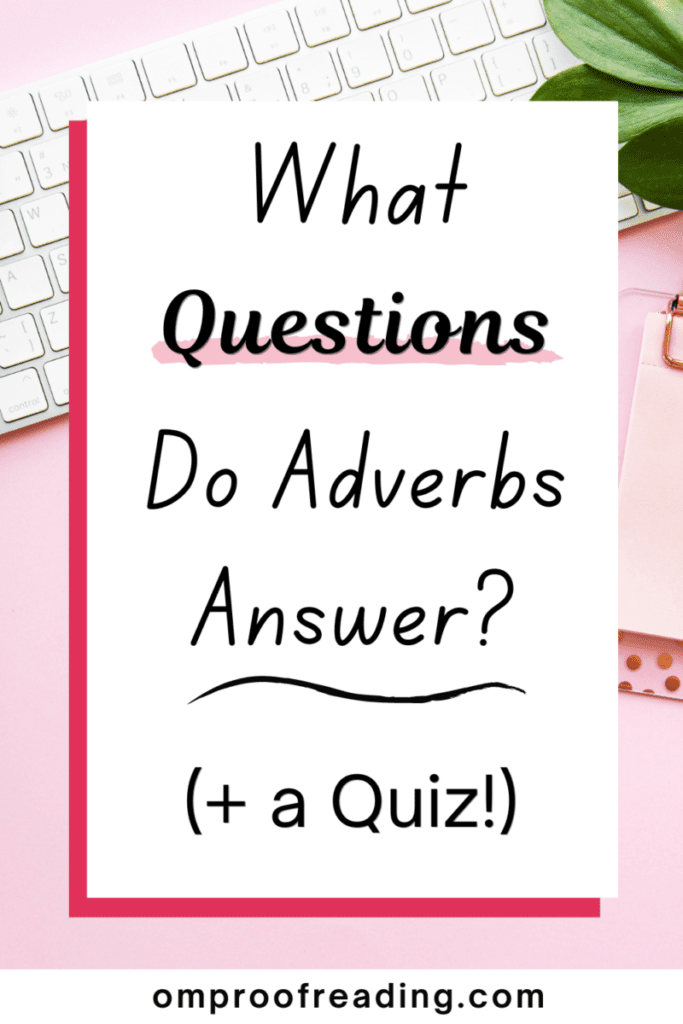This article may contain affiliate links. Please see our affiliate disclaimer in the footer menu for more information. Thank you for your support!

Adverbs are a versatile part of speech, capable of answering several questions. They help us speak and write clearly and effectively by providing additional information about an action or state of being.
Adverbs answer the questions how, when, where, and to what extent (how often or how much) about the verbs, adjectives, and adverbs they modify (describe). Adverbs often end in ly and can even modify entire sentences. Several types of adverbs exist in the English language.
Let’s explore the questions adverbs answer and the type of adverb that can answer each question. The names of the various kinds of adverbs give us a clue about what questions they answer.
We’ll see several example sentences for each question; then you can take a quiz to check your understanding.
The Questions Adverbs Answer
Before we get into the questions adverbs answer, let’s address a fundamental question: What is an adverb?
Let’s get an expert answer from The Chicago Manual of Style (CMOS)—the publishing industry’s go-to style guide:
“An adverb is a word (more particularly, an adjunct) that qualifies, limits, describes, or modifies a verb, an adjective, or another adverb.”
– CMOS
Adverbs are one of the eight parts of speech in the English language.
Here are the parts of speech:
- nouns
- pronouns
- verbs
- adjectives
- adverbs
- prepositions
- conjunctions
- interjections
As mentioned, adverbs can modify (describe) three out of the eight parts of speech listed above: verbs, adjectives, and adverbs.
Yes, adverbs can modify other adverbs. They’re flexible like that.😊
When adverbs modify one of these parts of speech, they typically answer one of the following four questions:
- How?
- When?
- Where?
- To what extent? (How often? or How much?)
By answering these questions, adverbs help us convey important details in our writing.
We can divide adverbs into six primary categories:
- Adverbs of Manner
- Adverbs of Time
- Adverbs of Place
- Adverbs of Frequency
- Adverbs of Degree
- Conjunctive Adverbs
You can see how the names of these adverbs—except for conjunctive adverbs—give us clues about the questions they answer.
For example, it’s no surprise that adverbs of place answer the question where.
We’ll be discussing all of the kinds of adverbs listed above, except conjunctive adverbs. Conjunctive adverbs don’t answer specific questions, so we’ll leave them out of the mix.
The Questions Adverbs Answer
| Question Adverb Answers | Type of Adverb |
|---|---|
| How? | Adverb of Manner |
| When? | Adverb of Time |
| Where? | Adverb of Place |
| To What Extent? (How Often?) | Adverb of Frequency |
| To What Extent? (How Much?) | Adverb of Degree |
As we see example sentences illustrating each of the questions adverbs answer, I’ll remind you what type of adverb (e.g., time, place, degree) answers that question.
Now that we understand what adverbs are and what questions they answer, let’s delve into each question, starting with how.
If you get confused at any point from now on, it may be helpful to read my article about how to recognize adverbs.
Adverbs Answer the Question How

Adverbs of manner tell us how an action is performed.
Examples of Adverbs of Manner:
- smoothly
- well
- neatly
- deliberately
- stealthily
- powerfully
- hastily
Let’s look at a few example sentences to understand how adverbs answer the question how.
1) Example Sentence: Steven carefully foraged for edible mushrooms.
The adverb carefully modifies the verb foraged.
Explanation: Carefully describes how Steven foraged.
- How did Steven forage? (carefully)
2) Example Sentence: The child skipped happily to greet her friend.
The adverb happily modifies the verb skipped.
Explanation: Happily describes how the child skipped.
- How did the child skip? (happily)
3) Example Sentence: The chef quickly prepared a tasty meal.
The adverb quickly modifies the verb prepared.
Explanation: Quickly describes how the chef prepared the meal.
- How did the chef prepare the meal? (quickly)
4) Example Sentence: The ballerina danced gracefully.
The adverb gracefully modifies the verb danced.
Explanation: Gracefully describes how the ballerina danced.
- How did the ballerina dance? (gracefully)
Now let’s explore how adverbs can answer the question when.
Adverbs Answer the Question When
Adverbs of time tell us when something happens.
Examples of Adverbs of Time:
- early
- tomorrow
- recently
- then
- now
- today
- after
1) Example Sentence: The musical ended late.
The adverb late modifies the verb ended.
Explanation: Late tells us when the musical ended.
- When did the musical end? (late)
2) Example Sentence: Steph will finish her Spanish homework soon.
The adverb soon modifies the verb finish.
Explanation: Soon tells us when Steph will finish her Spanish homework.
- When will Steph finish her Spanish homework? (soon)
3) Example Sentence: Michael returned from his trip to Africa yesterday.
The adverb yesterday modifies the verb returned.
Explanation: Yesterday tells us when Michael returned.
- When did Michael return? (yesterday)
4) Example Sentence: They will eat broccoli tonight.
The adverb tonight modifies the verb eat.
Explanation: Tonight tells us when they will eat broccoli.
- When will they eat broccoli? (tonight)
On to the question of where!
Adverbs Answer the Question Where

Adverbs of place describe where an action happens.
Examples of Adverbs of Place:
- here
- downstairs
- beneath
- inside
- near
- up
- north
1) Example Sentence: Julia looked everywhere for a four-leaf clover.
The adverb everywhere modifies the verb looked.
Explanation: Everywhere lets us know where Julia looked.
- Where did Julia look? (everywhere)
2) Example Sentence: The kids went outside to play.
The adverb outside modifies the verb went.
Explanation: Outside lets us know where the kids went.
- Where did the kids go? (outside)
3) Example Sentence: They traveled east to get to the beach.
The adverb east modifies the verb traveled.
Explanation: East lets us know where they traveled.
- Where did they travel? (east)
4) Example Sentence: Carlos left the flowers there.
The adverb there modifies the verb left.
Explanation: There lets us know where Carlos left the flowers.
- Where did Carlos leave the flowers? (there)
Now, let’s discover how adverbs can answer the question to what extent.
Adverbs Answer the Question to What Extent
Adverbs answer the question to what extent by telling us one of two things:
- How often?
- How much?
Let’s start with the adverbs that answer the question to what extent (how often).
Adverbs of frequency describe how often an action happens.
Examples of Adverbs of Frequency:
- continually
- frequently
- always
- yearly
- rarely
- weekly
- regularly
1) Example Sentence: Tom visits his dentist annually.
The adverb annually modifies the verb visits.
Explanation: Annually tells us how often Tom visits the dentist.
- How often does Tom visit the dentist? (annually)
2) Example Sentence: She routinely showers at night.
The adverb routinely modifies the verb showers.
Explanation: Routinely tells us how often she showers at night.
- How often does she shower at night? (routinely)
Now onto the adverbs that answer the question to what extent (how much).
Adverbs of degree tell us how much.
Examples of Adverbs of Degree:
- very
- deeply
- totally
- thoroughly
- barely
- profoundly
- marginally
1) Example Sentence: Nusly was moderately satisfied with her test score.
The adverb moderately modifies the adjective satisfied.
Explanation: Moderately tells us how much she was satisfied with her score.
- How much was she satisfied? (moderately)
2) Example Sentence: He seemed somewhat annoyed by her behavior.
The adverb somewhat modifies the adjective annoyed.
Explanation: Somewhat tells us how much he was annoyed by her behavior.
- How much was he annoyed? (somewhat)
Now we’ve seen how adverbs can answer the question to what extent.
Before the quiz, let’s check out two frequently asked questions.
Frequently Asked Questions

Why are adverbs important?
Adverbs are important because they help us communicate clearly by providing details. They can convey a particular tone, add emphasis, and make our writing more dynamic. However, adverbs need to be used with restraint to be effective.
What questions do adjectives answer?
Adjectives generally answer the questions what kind, which one, or how many regarding the nouns and pronouns they modify (describe). Although adverbs can modify other adverbs, adjectives cannot modify adjectives. Adjectives only modify two parts of speech: nouns and pronouns.
Quiz: Adverb Questions
Now that you’re more familiar with adverbs, here’s an opportunity to check your understanding.
You’ll receive feedback for any questions you miss.
Have fun! 😊
Important: After you complete the quiz, you’ll need to scroll back up the page a bit to click on the “View score” button.
I hope this article has taught you everything you need to know about the questions adverbs answer.
Best wishes to you!
“We may have all come on different ships, but we’re in the same boat now.”
– Martin Luther King Jr.

Recent Posts
Punctuation is important because it enables us to communicate our message clearly and effectively. Without punctuation, we wouldn’t understand how units of a sentence relate to one another or how...
Although you're probably somewhat familiar with adverbs, you may be unaware of sentence adverbs. As a trained proofreader who has studied the parts of speech, I can help you understand this unique...
